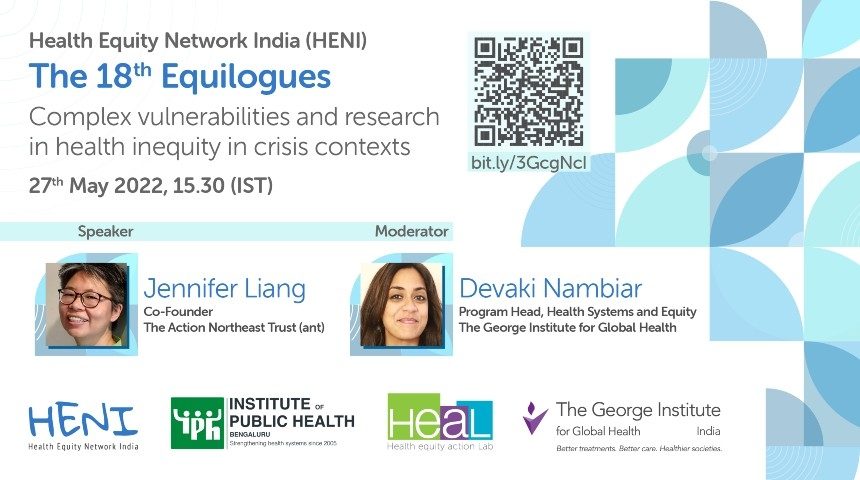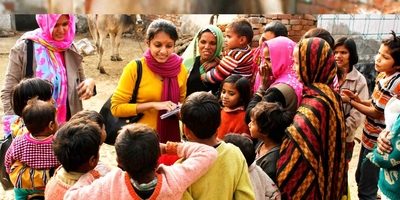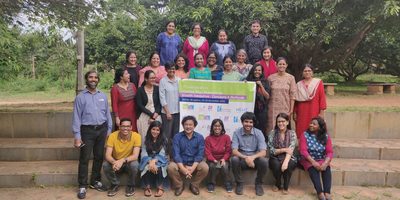
The HENI 18th Equilogues: Complex vulnerabilities and research in health inequity in crisis contexts

The Health Equity Network India (HENI) secretariat co-hosted at The George Institute for Global Health, India and The Institute of Public Health, Bengaluru is organising the 18th Equilogues underlining the theme “Complex vulnerabilities and research in health inequity in crisis contexts”.
Mark your calendars for 27th May 2022 | 15:30 IST
Conflict is a major driver of health inequities. The literature on health and conflict has shown how conflicts impede health system functioning including disruption of supply chains, breakdown of social and economic systems, and exodus of healthcare workers. It is equally crucial to understand how health systems are affected during low-intensity protracted conflicts – and the consequences borne by communities living and serving in such contexts.
A research study conducted by the ant (the action northeast trust) in 2016-17 titled Health Inequities in a Conflict Area: An In-depth Qualitative Study in Assam and the subsequent book published in 2021 Health Inequities in Conflict-affected Areas - edited by Samrat Sinha and Jennifer Liang – explores these dimensions. These pieces of work highlight people’s experience of deep vulnerabilities as a result of the breakdown in provision of the state’s health services due to a prolonged low intensity conflict in Assam at the Indo-Bhutan border.
The HENI 18th Equilogues is being hosted by Jennifer Liang from the ant (the action northeast trust) who will draw from the aforementioned work to speak about:
- The complex vulnerabilities experienced by people during protracted conflict/crisis contexts
- The ethical and methodological considerations deemed critical while carrying out research with conflict-affected communities in difficult-to-access geographies
Speakers
Jennifer Liang, Co-Founder, The Action Northeast Trust (ant)
Jennifer has been working in the northeast region of India for over 25 years since she completed her M.A in Social Work from Tata Institute of Social Sciences, Mumbai. In the year 2000, Jenny co-founded the ant, an NGO working for rural development, and lived and worked in villages of Chirang District of Bodoland in Assam. She headed the ant as its Executive Director the decade of 1996 to 2016 and is currently involved in IDeA, an initiative of the ant to strengthen the voluntary sector in Northeast India. She enjoys her role especially in creating and running participatory training programmes and de-stresses by designing easy-to-use communication materials.
Liang has been a Chevening Gurukul Scholar (2013, London School of Economics) and her thesis then was to look at women’s political participation in local governance in U.K. She has co-authored a book “Health Inequities in Conflict-affected Areas: Armed Violence, Survival, and Post-Conflict Recovery in the Indo-Bhutan Borderlands” which was published by Springer-Nature, Singapore in March 2021.

Moderator: Dr Devaki Nambiar - Program Head, Health Systems and Equity, The George Institute for Global Health
Devaki holds a doctorate in public health from Johns Hopkins. She has more than a decade of research experience in over half a dozen countries and as many Indian states. Her interest is in research and action on the social and political determinants of health and health reform in resource-poor settings. A former Fulbright scholar, she has received awards from the US National Institutes of Health, the Wellcome Trust/Department of Biotechnology India Alliance, Canada’s International Development Research Centre, as well as several international and national research agencies. She advises the work of the World Health Organisation on health inequality monitoring and supports policymaking in India on Universal Health Coverage and urban health reform, as well as non-communicable disease (NCD) service delivery as part of comprehensive primary health care.





